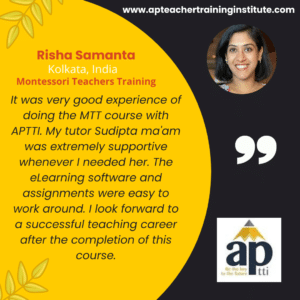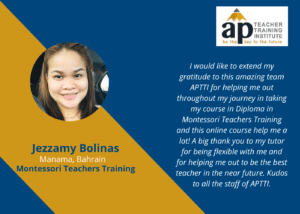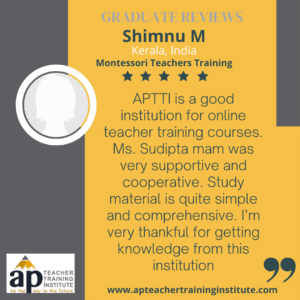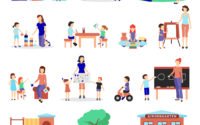Exploring the Montessori Teacher Training Course Curriculum
If you are thinking about becoming a Montessori teacher, you may be curious about the Montessori Teacher Training course curriculum and the important themes covered. Montessori teacher training is a rigorous and thorough curriculum meant to provide professionals with the information, skills, and resources needed to establish successful and engaging learning environments for children. Whether you attend a Montessori training program in person or online, you are likely to study a variety of topics, including child development, classroom management, and Montessori philosophy and principles. In this, we’ll explore all those topics and how Montessori has mastered that.
What is Montessori Teacher Training Course Curriculum?
Montessori training online helpes teacher with the Montessori Program that provides children with a comprehensive curriculum comprising five crucial domains of study: Practical Life, Sensorial, Mathematics, Language, and Culture. Every area of learning comprises a series of specialized Montessori tools designed to teach a particular skill or knowledge which is superior from random online teacher training. By practicing with these materials repeatedly, children acquire a firm foundation of each concept and develop mastery of essential competencies within each curriculum domain.
Montessori teachers employ effective instructional methods by presenting crucial lessons that introduce children to the name and learning objectives of each Montessori tool which they learned in online Montessori training course. After receiving the Key Lesson, children work independently with the Montessori materials to reinforce their understanding, explore new ideas, and establish connections with the key learning outcomes.
At this stage, instructors of Montessori teacher training institute step back and attentively observe how children are engaging with the materials while documenting their progress. Teachers only offer assistance as necessary, emphasizing the significance of fostering children’s autonomy since it plays a crucial role in their ability to learn and absorb new information effectively.
New lessons are only presented when children are prepared to move on to the subsequent level. As children work with the Montessori materials repeatedly, they progressively gain mastery of the subject matter, and their understanding of each curriculum area deepens. During this time Montessori teachers can update themselves with latest teaching methods with the help of montessori training course online.
What are the Training Key Topics, Covered in Montessori Classroom Management
Practical Life
The Practical Life Program within montessori training centre encompasses an array of activities that children frequently encounter in their daily lives. These exercises are designed to foster children’s independence, concentration, and dexterity. Examples of typical practical life activities include transferring objects, food preparation, lessons in social etiquette, and cleaning. All these are taught to teachers in an teacher training course, so it’s easy for them to face.
Sensorial
The Sensorial Program in Montessori education focuses on refining children’s sensory perceptions of sight, touch, sound, smell, and taste. The objective is to help children categorize and make sense of sensory information, thus enhancing their comprehension of the surrounding world.
Sensorial materials facilitate the learning process by enabling children to differentiate between various attributes such as similarity and difference, dimensions, colors, and shapes, as well as distinguish between smells, tastes, and sounds. This program also prepares children for mathematics, language, and geometry by introducing skills such as classification and sorting.
Mathematics
The Montessori Mathematics Program employs a hands-on approach to teach children abstract mathematical concepts and relationships. Through interactive learning experiences, children learn to count, identify and match numerals with their corresponding quantity, comprehend decimal quantities and symbols, and understand the functions of addition, subtraction, multiplication, and division by utilizing Montessori materials.
Language
The Montessori Language Program equips children with the necessary tools to expand their vocabulary and language comprehension. This program employs Montessori language materials to facilitate interactive learning experiences, developing the fundamental skills for reading, writing, and oral language. Children acquire proficiency in phonics, letter identification and formation, word formation, sentence building, and proper pencil-holding techniques. Oral language skills are honed through daily social interactions, group activities, and lessons in social etiquette.
Culture
The Montessori Culture Program covers an extensive array of subjects such as Geography, Botany, Zoology, Science, History, Music, and Art. This program aims to broaden children’s understanding of their community, the world, and their social obligations through cultural explorations. Children learn to exhibit respect for diversity, appreciate music and art, and develop an awareness of sustainability.
What is Montessori Philosophy and Pedagogy?
Philosophy: Montessori philosophy and practice aim to cultivate a self-driven and thorough development in children and adolescents across all aspects of their growth. The ultimate objective is to nurture each child’s inherent inclination for knowledge, understanding, and respect.
Pedagogy:: Montessori pedagogy grants children the autonomy to explore and progress toward their maximum potential while engaging with didactic materials, both in groups and independently, within a meticulously prepared environment. The Montessori method is founded on the concept of respect for oneself, others, and the environment. Each room in a Montessori school is designed to cater to the developmental needs of the particular age group served in that setting.
What Montessori Teacher Training Course Curriculum entails for Child Development and Psychology?
Hands-on learning:
Montessori schooling prioritizes hands-on learning through sensory experiences, which facilitates the development of a profound comprehension of the surrounding world for children.
Independence:
The Montessori education system promotes independence among children by granting them the liberty to investigate their surroundings and learn at their own pace.
Self-discipline and self-motivation:
By emphasizing the importance of taking charge of one’s own learning, the Montessori approach instills self-discipline and self-motivation in children.
Mixed-age classrooms:
Montessori learning environments often consist of children of varying ages, creating opportunities for social skill development and peer-to-peer learning.
Individualized learning:
Tailored to suit each child’s learning pace and style, Montessori education is personalized for individual needs.
Respect for the child:
Central to the Montessori philosophy is the recognition that children possess tremendous learning potential and should be treated with respect and dignity.
What is Montessori Curriculum Design and how it implement that?
Curriculum Design
Montessori pedagogy aims to cultivate the potential of every child through educational experiences that foster their cognitive, physical, emotional, and social growth. Alongside mathematics and language, the Montessori Curriculum encompasses practical life, sensorial, and cultural subjects.
Implementation
- Valuing the child
- Acknowledging the absorbent mind
- Recognizing sensitive periods
- Creating a prepared environment
- Promoting self-education
Conclusion
A Montessori training course is a rigorous and thorough curriculum that provides persons with the skills and knowledge required to become competent Montessori teachers. You can expect to study a wide range of subjects, including child development, classroom management, and Montessori philosophy and principles, whether you decide to attend a Montessori training center in person or take Montessori training online. After finishing a Montessori teacher training program, you will be well-equipped to give high-quality, engaging, and effective instruction to young learners.








